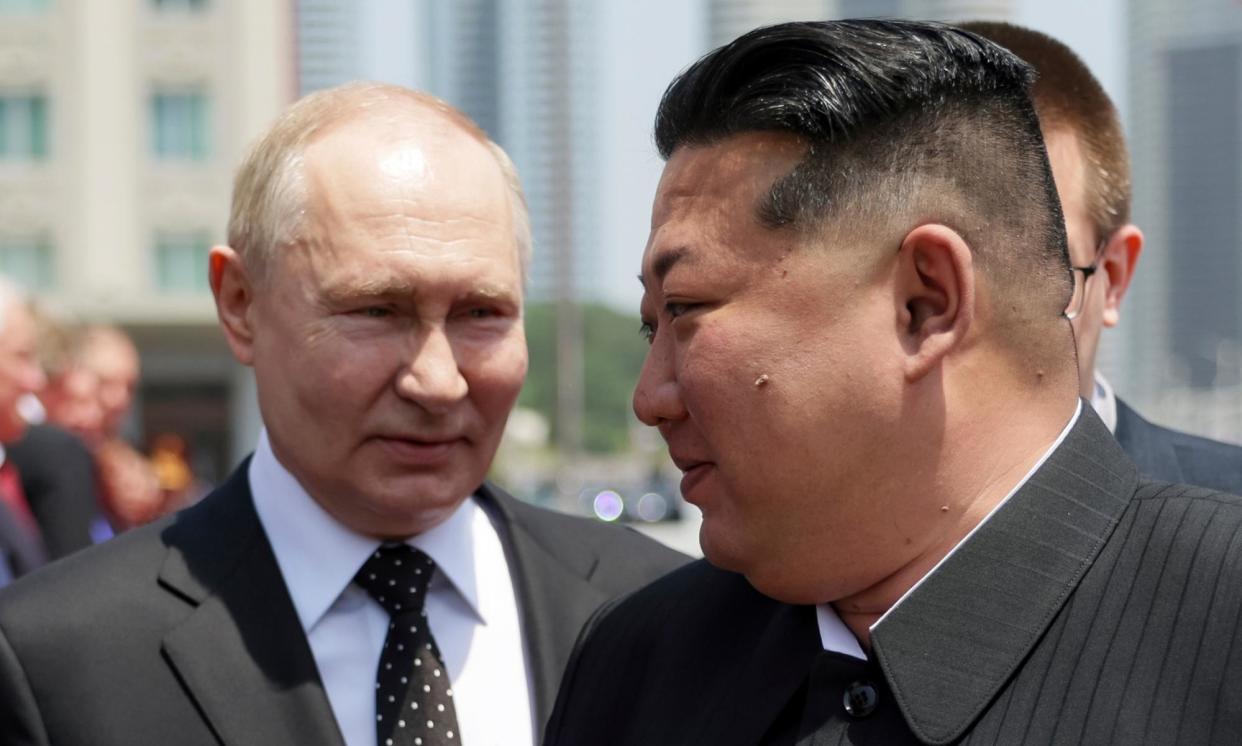The Observer view on Vladimir Putin’s reckless visit to Asia

Vladimir Putin’s visits to North Korea and Vietnam last week caused great consternation among the western powers, which was undoubtedly his intention. The Russian president is keen to demonstrate that, notwithstanding the widespread condemnation of his illegal, full-scale invasion of Ukraine and the ensuing diplomatic ostracism and sanctions, he still has international support, and can raise the cost to his opponents of continued backing for Kyiv.
If anyone doubted the extent to which the war in Ukraine has become a truly global issue, here was conclusive proof of its almost universal impact. Putin and North Korea’s dictator, Kim Jong-un, signed a mutual defence treaty that commits each country to provide military assistance to the other “with all means at its disposal” in the event of an attack. The treaty represents a significant boost for Kim’s isolated regime – and for Putin’s efforts, with China, to build up an anti-democratic, anti-western international alliance.
The deal directly contradicted Russia’s past support for UN security council sanctions intended to rein in Pyongyang’s proliferating, regionally destabilising nuclear weapons and missiles programmes. Worse still, Putin suggested that Russia may directly arm North Korea despite the fact Kim regularly threatens South Korea, Japan and the US with atomic annihilation.
Putin linked such mooted arms supplies to western arms supplies to Ukraine and, in particular, the Biden administration’s recent decision to allow its longer-range missiles to be used by Kyiv to hit targets inside Russia. The quid pro quo for Putin, though he denies it, is Kim’s ongoing provision to Russia of artillery shells and ballistic missiles for use against Ukraine.
As usual, Putin claims to be acting in response to provocative western actions when, in reality, it is he who is doing the escalating. Reacting to the North Korea pact, South Korea said it may reconsider previous refusals to send arms to Ukraine. This in turn elicited furious Russian protests. Yet there’s no doubt who bears primary responsibility for this destructive spiral: the country that believes it’s OK to invade another’s sovereign territory.
Xi Jinping will hardly thank Putin for contaminating the east Asian sphere with the fallout from his Ukraine catastrophe
For all that, Putin’s peregrinations smack a little of desperation. They could backfire. Kim is an unpredictable character who may or may not keep his word – or his head. It is not impossible to envisage a situation in which Russia is dragged into an unforeseen confrontation. Moscow’s neediness implies more fundamental, structural weakness. And then there is the regional impact to consider.
The US, Japan and South Korea agreed last year to deepen security and defence cooperation, and a follow-up summit is expected next month on the sidelines of the Nato summit in Washington. This trilateral alliance is about the growing threat from China, but it is also about North Korea. If these three, backed by the likes of Australia and Britain, now decide to further expand their regional defensive military presence, Beijing may fairly hold Putin to blame.
Such an outcome could strain the 2022 eve-of-invasion “no limits” strategic partnership between Moscow and Beijing, which is so vital to Putin. Xi Jinping, his Chinese opposite number, will hardly thank him for contaminating the east Asian sphere with the toxic fallout from his Ukraine catastrophe. Likewise, Putin’s smarmy attempts to ingratiate himself with Vietnam may not sit well with Beijing, which has its own issues, including territorial disputes, with Hanoi’s US-friendly leadership.
These developments again underline the urgent need for an end to the Ukraine crisis with its ubiquitous negative ramifications. One man – the same man who triggered it – could halt it today if he so chose. By refusing to do so, unscrupulous, infinitely reckless Putin proved again last week that he is global public enemy number one.


